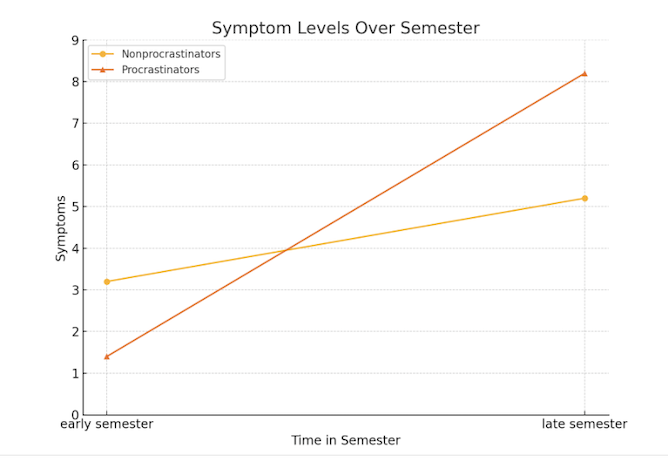When Procrastinators Finish Early
Meet Jonah
Jonah likes to procrastinate. He doesn’t break things up into smaller chunks. He drinks a surprising amount of coffee for a teenager. He’s really into editing videos for his YouTube channel. He lives and dies by what he calls “the vibe.”
He gets his work in, eventually. But he’s never early. He tells us and his parents he works best under pressure. I believe him! Stress can help focus the mind.
But we wondered if the benefits he was experiencing (heightened concentration the night before something was due) were offset by costs (the stress he carried around with him, the sleep deprivation, the cognitive “overhang.”)
So when he had a 2,000-word U.S. History paper due in a couple weeks, we tried something new. His typical process was - start 1 or 2 days before, scramble, try to clean up a bad AI-generated draft, hate that draft, and then stay up all night to finish. Our new process was rooted in common sense: gather sources and write an outline (day 1), then 500 words a day (days 2-5), then a day for review and polish (day 6). Oh and - text me along the way on how it’s going.
And for the first time, he actually followed the plan. He handed it in on Wednesday, two days before it was due.
When I asked how it felt to have it done early, Jonah paused, then said:
“Honestly? Kinda peaceful. I hated the plan initially. Bro I actually kinda hated you a little bit. But my usual process stresses me out. It wasn’t hanging over me this week.”
That line - “It wasn’t hanging over me” - stuck with me. I didn’t expect Jonah to find emotional relief. I thought procrastinators procrastinated because they didn’t find emotional relief from starting and finishing early.
I was wrong.
Procrastination Is Rational (and then it isn’t)
Tice and Baumeister tracked students across an academic term way back in 1997. Early on, procrastinators reported lower stress and greater well-being. (Picture Jonah nodding.) But then … things got worse.
By the end of the semester, they experienced more anxiety, worse health outcomes, and lower grades. The short-term emotional relief they gained from delay came at the cost of long-term distress.
Psychologists call this present bias: the tendency to prioritize short-term “mood repair” (e.g. watching YouTube or scrolling Discord) over long-term goals (e.g. getting an A on the paper). Aristotle explored akrasia, the weakness of will, the doing things against our better judgment. It’s why procrastination is often framed as a form of emotional self-regulation, not just a time management problem.
What’s been surprising to me is that finishing early can also offer short-term emotional payoff, even for procrastinators. In fact, it might offer more of it than delay does.
Why Early Completion Feels Good
Several mechanisms help explain the unexpected satisfaction teens like Jonah feel when they finish early:
1. You don’t carry the stress
Some studies show that the act of completing a task removes what’s called an ‘aversive internal state” - or the stress, uncertainty, cognitive load of a task undone. This is textbook negative reinforcement: you feel better because the uncomfortable feeling goes away. The longer you delay, the more this stress accumulates. When you finish early, that anxiety never has a chance to build.
2. You’re not mentally tired
David Rosenbaum’s work on “pre-crastination” (the tendency to complete tasks as soon as possible) shows that people often exert more effort upfront just to get something off their mind. The unfinished task lingers in working memory, quietly draining mental bandwidth. Once completed, the brain feels lighter. You’re not “carrying” the task anymore.
For teens with executive function challenges, that cognitive lightness matters. Remember that they often have limited working memory “storage,” so getting rid of something creates space for something else.
3. You challenge the prevailing view about yourself
Finishing something early forced Jonah to update his priors: He was no longer the “I’m always behind” or “I never start on time” guy.
When Jonah finished that history paper by Wednesday, he had a couple of days to relax and hang out after school instead of dreading the paper. But he incrementally updated his view of himself - not a guy who always waited until the last minute.
You have to FEEL IT
Procrastination is emotionally rational in the short term. But early completion can be emotionally rational too, if it becomes familiar.
In our coaching, we don’t just ask “Did you do the thing?” We ask:
“How did it feel to have it done?”
“Was your night different because of it?”
“Would you want to feel that way again?”
We want teens to build memory of that feeling - the peace, the ease, the extra time. We find that it’s a lot more motivating to feel it than to have it explained to you.
